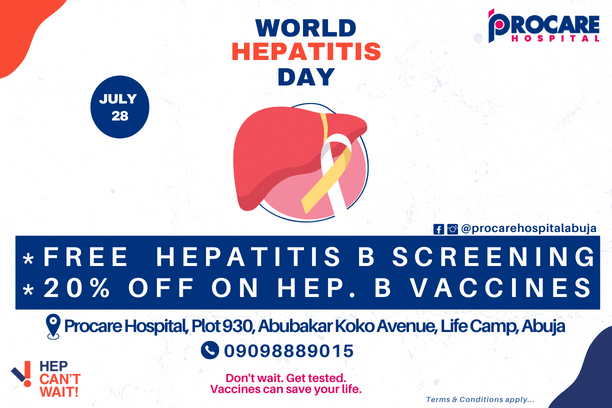WORLD HEPATITIS DAY (JULY 28)
Hepatitis is an inflammation of the liver that is caused by a variety of infectious viruses and non-infectious agents, leading to a range of health problems. There are five (5) main types of hepatitis virus; types A, B, C, D and E. Although they all cause liver disease, they differ in severity of illness, demographic distribution, mode of distribution and methods of prevention.
Types B and C in particular, lead to chronic disease in millions of people and together are the most common causes of liver cirrhosis, liver cancer, and viral hepatitis-related deaths.
According to WHO, the burden of hepatitis B infection is highest in Africa and the West Pacific region where 81 million and 116 million people respectively are chronically infected.
MODE OF TRANSMISSION
Hepatitis A and E are transmitted via fecal-oral route (contaminated food/water). Hepatitis B virus (HBV) is spread through exposure to infected bodily fluids, unsafe chronic intravenous drug use, surgical/dental procedures, mother to child transmission at birth and sexual transmission. Hepatitis C and D are transmitted parenterally.
The most common route of hepatitis B transmission worldwide is from mother to child during child birth (perinatal transmission).
SYMPTOMS
Hepatitis A, B, C, D and E exhibit only mild or no symptoms at all. However, each form can cause more severe symptoms that can lead to death.
Most people do not experience any symptoms when newly infected with hepatitis. However, some people have acute illness that lasts for several weeks, including yellowing of the skin and eyes (Jaundice), dark urine, extreme fatigue, nausea/vomiting and abdominal pain.
DIAGNOSIS
It is not possible on clinical grounds to differentiate each type of hepatitis from each other, hence laboratory confirmation of the diagnosis using blood samples is essential.
TREATMENT
In the management of hepatitis, care is aimed at maintaining comfort and adequate nutritional balance including fluid replacement.
Hepatitis A and E infections are mild, with the majority of people recovering fully and developing immunity to further infection.
Chronic hepatitis B infection can be treated with antiviral agents. Treatment can slow the progression of cirrhosis, reduce incidence of liver cancer thereby improving long term survival. However, only a proportion of people with chronic hepatitis B infection will require treatment. It is advised to avoid unnecessary medications due to the negative effect on liver function caused by these infections.
More than 95% of persons with hepatitis C infection can be cured by antiviral medications, thereby reducing the risk of death. Although access to diagnosis and treatment remains low.
PREVENTION
Safe and effective vaccines are available to prevent hepatitis A and E.
Hepatitis B vaccines are readily available and safe as well. This vaccine also prevents the development of hepatitis D virus and given at birth, strongly reduces transmission risk from mother to child.
WHO recommends that all infants receive the hepatitis B vaccine as soon as possible after birth, preferably within 24 hours, followed by 2 or 3 doses at least 4 weeks apart to complete the immunization series. These doses provide 98%-100% protection against HBV infection.
For infected pregnant mothers; WHO recommends administering Tenofovir (preventive therapy), from the 28th week of pregnancy until at least birth. Hepatitis B immunoglobulin should be given shortly after birth. This provides additional protection to the child.
There is no cure for hepatitis C infection.
KEY FACTS
- Hepatitis is an inflammation of the liver. The disease can be acute or chronic, caused by various strains referred to as type A, B, C, D, and E. Each form of virus can cause severe symptoms. However, hepatitis B and C are the most common and can cause fatal liver diseases, like cirrhosis of the liver and liver cancer.
- It is possible to determine whether or not you have been infected with viral hepatitis through blood tests.
- Hepatitis vaccines are safe, available, and effective. You will not get hepatitis from a vaccine.
- Protection from hepatitis B lasts at least 20 years and is probably lifelong. Also, booster vaccinations for persons who have completed the 3-dose vaccination schedule are not needed.
- Practice proper personal hygiene, and practice safe sex.
FREE HEPATITIS B SCREENING!
On this World Hepatitis Day, let us pledge that we will never neglect our health or that anyone else would neglect theirs.
This is why @procarehospitalabuja is having
– FREE HEPATITIS B SCREENING!
– 20% DISCOUNT ON HEPATITIS B VACCINES!
Date: Thursday, July 28, 2022.
VENUE: Procare Hospital Premises.
Don’t Wait, Get Tested, Vaccines can save your life!
#procarehospitalabuja #worldhepatitisday #clinic

